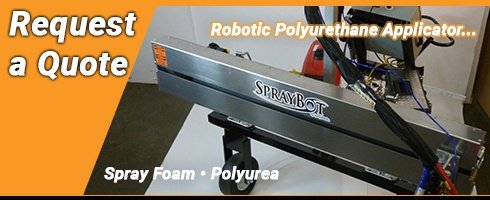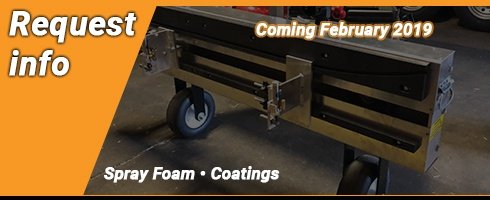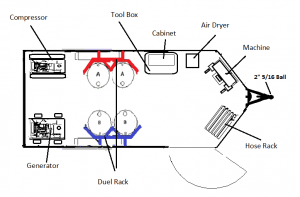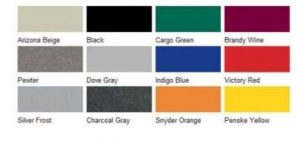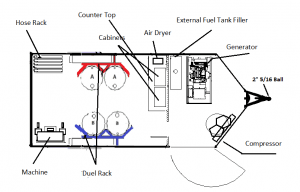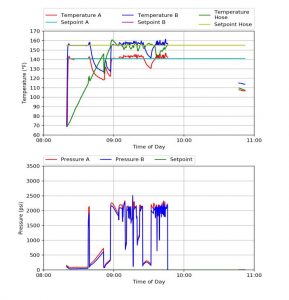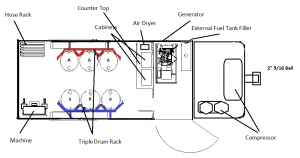Polyurea coatings are used to prolong the lifespan of structures by providing them with qualities that result in reduced repairs and replacements. They do this by adding a waterproof and weatherproof seal that increases durability and longevity.
You can use polyurea coatings in commercial, residential, and industrial settings to coat bed liners, garage floors, roofs, roads, bridges, and so much more. Once applied, these coatings last for around 10-15 years, giving your client a long-term solution for protecting their surfaces. Read on to discover all the benefits of using polyurea coatings.
Your Guide to Using Polyurea Coatings
Polyurea coatings are often chosen for surfaces because they feature characteristics that roofs, floors, and other areas need but don’t have as part of their own construction. With that said, it is easy to apply a coating to supplement a surface and make it last as long as possible.
Here are some characteristics of polyurea coatings that make them suitable for usage on so many different surfaces:
- Waterproof – These coatings provide an effective barrier against water which makes them appropriate for applications that require waterproofing
- Flexible – They are also known for having great flexibility, which means that when polyurea coatings are applied to surfaces, they are able to withstand movement and abrasive elements without cracking
- Durable – Polyurea coatings protect surfaces from wear and tear since they are resistant to impact, chemicals, and other environmental factors that could damage a surface
- Versatile – With the ability to adhere to and create a bond with a variety of surfaces, these coatings work well when applied to concrete, wood, metal, and more
- Quick-drying – Since polyurea coatings cure in only seconds or minutes, they allow for fast applications and reduced downtime
- UV resistant – Some polyurea coatings are able to resist UV light which leads to a stronger hold and reduced color fading when exposed to sunlight
The Process for Applying Polyurea Coating
When you’re ready to begin using polyurea coatings in a facility, you’ll want to take the following steps:
- Inspect – Start by inspecting your surface and identify if there are any preexisting coatings present. Take note of any cracks or defects as well and be sure to notify the property owner of any major structural issues that need to be addressed.
- Clean – Once you have noted any defects and cracks, it is time to start cleaning the surface. Try to get rid of any dirt, dust, grease, wax, or anything else that will prevent a smooth coating job. Use a scrubber or power washer if necessary.
- Repair – After the surface is clean, you will want to repair the cracks found from step one. Make sure that any repairs conducted are smooth and level.
- Remove – Use methods like sanding, grinding, blasting, and more to remove any old coatings or paint from the surface.
- Clean again – Clean up any debris from the preparation work to ensure a smooth application.
- Prepare – Prepare the area by adding tape and plastic to materials that should not receive the polyurea coating.
- Mix – Start mixing the polyurea components, following the guide for instructions. Then, spread the polyurea coating using your equipment for a smooth application.
Once you apply the coating, be sure to allow for proper curing time and examine to ensure uniform coating so you can identify any areas which may need fixing later on.
Industries That Benefit Most from Polyurea Coating
Industries that benefit from polyurea coatings include the following:
- Building and construction
- Manufacturing
- Technical R&D
- Conservation and waste management
- Education
- Oil and gas
- Bridges and infrastructure
- Utilities
- Marine
- Rail
- Agriculture
- Mining
FAQs About Polyurea Coating
How are polyurea coatings made?
Polyurea coatings are created when a chemical reaction occurs between two components: isocyanate and resin. These compounds are mixed in the drum of a spray gun and then sprayed onto the desired surface.
Can polyurea coatings be applied to any surface?
Polyurea coatings can be applied to practically any surface. They can even be applied to surfaces that are cold or damp, reducing facility downtime.
Can polyurea coatings be environmentally friendly?
Some formulations of polyurea coatings are made with organic compounds to reduce the environmental impact they make. The composition will vary between manufacturers so be sure to check with them if you have questions.
How durable are polyurea coatings?
Polyurea coatings are designed to withstand harsh weather outside and continuous foot traffic inside, making them a robust and long-lasting option for any facility.
What is better: polyurethane or polyurea?
Polyurea and polyurethane are often used in different applications, so the better option will always depend on the application. When you are working on a project that requires durability, fast curing, and resistance to chemicals or other harsh elements, we recommend polyurea coatings.
However, not every application needs something this intense. Polyurethane works for applications requiring both decoration and protection. Therefore, it is best to thoroughly understand your project needs before picking a coating.
What machine is the best for applying polyurea coatings?
Polyurea coatings are applied using high-pressure-rated equipment since they require between 1850 to 3500 PSI for the best results. The machine should also have a heating point between 100° and 180° Fahrenheit. With these factors in mind, we recommend a PMC polyurea machine or a Graco polyurea machine for application.
What are the different types of polyurea coatings?
The various coating types include:
- Pure – Pure polyurea that offers superior protection
- Hybrid – Mixed with other materials for specific performance needs
- Aromatic – Used for environments where UV deterioration is not a concern
- Aliphatic – Contains superior UV-resistance and color retention characteristics
- Fast-setting – Fastest curing polyurea coating
- High-build – Applied thickly for added durability
- Elastomeric – Provides the best flexibility and elongation
- Abrasion-resistant – Best for high-traffic areas where extra protection is needed
- Chemical-resistant – Less likely to deteriorate when exposed to chemicals, acids, and corrosive substances
- Decorative – Can be customized to achieve color, texture, and pattern preferences
SprayWorks Equipment Is Your Destination for Polyurea Coating Tools
SprayWorks Equipment has over 100 combined years of industry experience, making us the best destination for coating equipment. We offer reliable and efficient equipment to all fifty states, Canada, and Mexico. Be sure to check out our store for polyurea coating equipment.
If you are new to the business, you can also consider our training classes that will help you to grow your skills to an expert level in no time!
Contact Us Today for Assistance!
If you have any questions about polyurea coatings or the equipment required to apply them, be sure to reach out to our team!

